I quoted a blogspot three years ago to give a general introduction. Now let's revisit the basic constitutions derived based on Yin and Yang.
The concept of constitution is widely applied in the practice of traditional Chinese medicine (TCM). Constitutional consideration is an important process for clinical diagnosis and treatment, and it also lays the foundation for health promotion and disease prevention.
| TCM claims that due to inherited and acquired influences, each of us has some uniqueness in regarding to structural, physiological and psychological aspects. These individual characters combine to form body constitution that determines how we live and behave, and our susceptibility to pathogens and disease development. Since constitution formation is affected by a variety of inherited and acquired factors: |
Body constitution can vary from person to person, some are strong, some are weak, some tend to be heat, and some tend to be cold. According to the China Association for Traditional Chinese Medicine (CACM), body constitution can be divided into nine types, named as neutral, qi deficiency, yang deficiency, yin deficiency, blood stasis, phlegm & dampness, damp-heat, qi stagnation and special constitution. Generally, the classification of body constitution is based on physical outlook, personality, common health problems, and adaptation to external environment.
|
| 1. Neutral type | 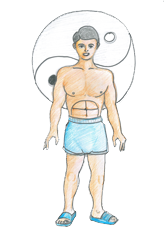 | |
| Individuals have a strong physique, stable emotional or mental state and feel optimistic. They often present with lustrous complexion and hair, bright eyes, proper senses of smell and taste, red and moisture lips, uneasy to feel fatigue, good sleep and appetite, normal bowel and urinary habits. They are adaptable to environmental changes. | ||
| 2. Qi deficient type | 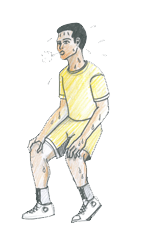 | |
| Individuals tend to have flabby muscles, and are introvert and timid in personality. They often present with feeble voice, shortness of breath, fatigue, catching cold or flu easily, sweating and teeth marks in the tongue margin. They are sensitive to environmental changes. Since individuals are relatively weak in immune functioning, it usually takes a longer time for them to recover from illnesses. | ||
| 3. Yang deficient type | 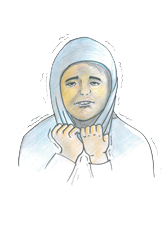 | |
| Individuals tend to have flabby muscles, and are quiet and introvert in personality. They often complain about cold hands and feet, cold feeling in stomach, sensitive to low temperatures or noises, sleepiness, discomfort after eating cold foods, and a pale and bulky tongue. They often feel uncomfortable in windy, cold and humid environments. They are susceptible to health problems such as puffiness, diarrhea and excess throat secretions. | ||
| 4. Yin deficient type | 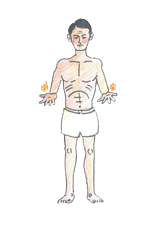 | |
| Individuals usually have a thin physique, and are outgoing and impatient in personality. They like to complain about warm palms and soles, mouth dryness, dry nose, preference for cold drinks, dry stools or constipation. They often feel uncomfortable in hot and dry environments. They are susceptible to cough, fatigue, seminal emission, insomnia, and some chronic conditions. | ||
| 5. Phlegm & dampness type | 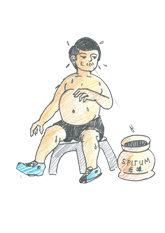 | |
| Individuals are usually overweight and have tummy, they have a mild temper, steady and patient personalities. They often present with oily face, sticky or sweet taste in the mouth, excessive throat secretion, sweating, chest stuffiness, preference for sweet and greasy foods, and a thick tongue coating. They often feel uncomfortable in humid and rainy environments. They are susceptible to diabetes, metabolic syndrome or cardiovascular diseases. | ||
| 6. Damp-heat type | 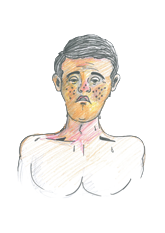 | |
| Individuals are either with a normal or thin physique, they tend to be irritable and short-tempered. They often present with an oily face that erupts acne or pimple frequently, a bitter or strength taste in the mouth, fatigue or heaviness of the body, uncompleted feeling after defecation or dry stools, yellow urine, excess vaginal discharges in female, wet scrota in male, and a yellow and greasy tongue coating. They are sensitive to humid and hot environments especially in late summer or early autumn. They are susceptible to skin problems and urinary difficulties. | ||
| 7. Blood stasis type | 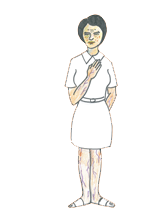 | |
| Individuals tend to be impatient and forgetful. They often present with a dull complexion, spots on the face, dark-red lips, dark circles under eyes, lusterless or rough skin, unknown bruise on the body surface, and varicose veins. They often feel uncomfortable in cold environments. They are susceptible to bleedings, painful conditions, and abnormal growths. | ||
| 8. Qi stagnation type | 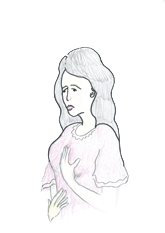 | |
| Individuals are mostly thin, and tend to be emotional unstable, melancholy or suspicious. They often present with a depressed mood, being nervous or anxious, timid, frequent sighing, and heart palpitations. They respond relatively poor to stressful situations, especially in winter and autumn and also rainy days. They are susceptible to insomnia, depression, anxiety disorder and breast lumps. | ||
| 9. Special constitution type | ||
| Individuals usually have inborn weakness, they are very sensitive to drugs, foods, smells, pollen or other environmental allergens. They often develop nasal congestion, sneezing, runny nose, panting, wheals, itchiness and even purple spots or patches under the skin. Common health problems among individuals are drug allergies, hay fever, eczema and asthma. They respond relatively poor to external influences, and their health problems can easily be induced by seasonal changes. | ||
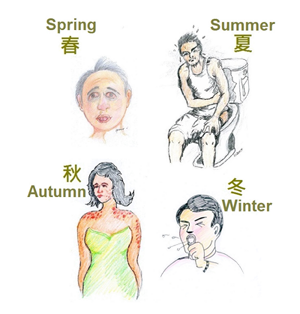 | ||
It should be emphasized that in reality, it is hard to classify into one type individually, as a mixed type is likely to present, for example, yin deficiency and damp-heat, qi deficiency and dampness, qi stagnation and blood stasis. For most people, consulting a TCM professional is the best way to know their body types.
In TCM experiences, a person’s body constitution is not constant and unchangeable, as factors like living environment, mental state, diet, daily activities and diseases can easily change the body’s condition. For some unhealthy constitutions, we can take active measures, such as lifestyle modifications, nutrition or exercise, to alert them to more a neutral and healthy state. Taking control of health according to the body constitution types is an important part in the Yang Sheng Fa (Principles for Nourishing Life) of TCM.
Source: http://www.shen-nong.com
No comments:
Post a Comment